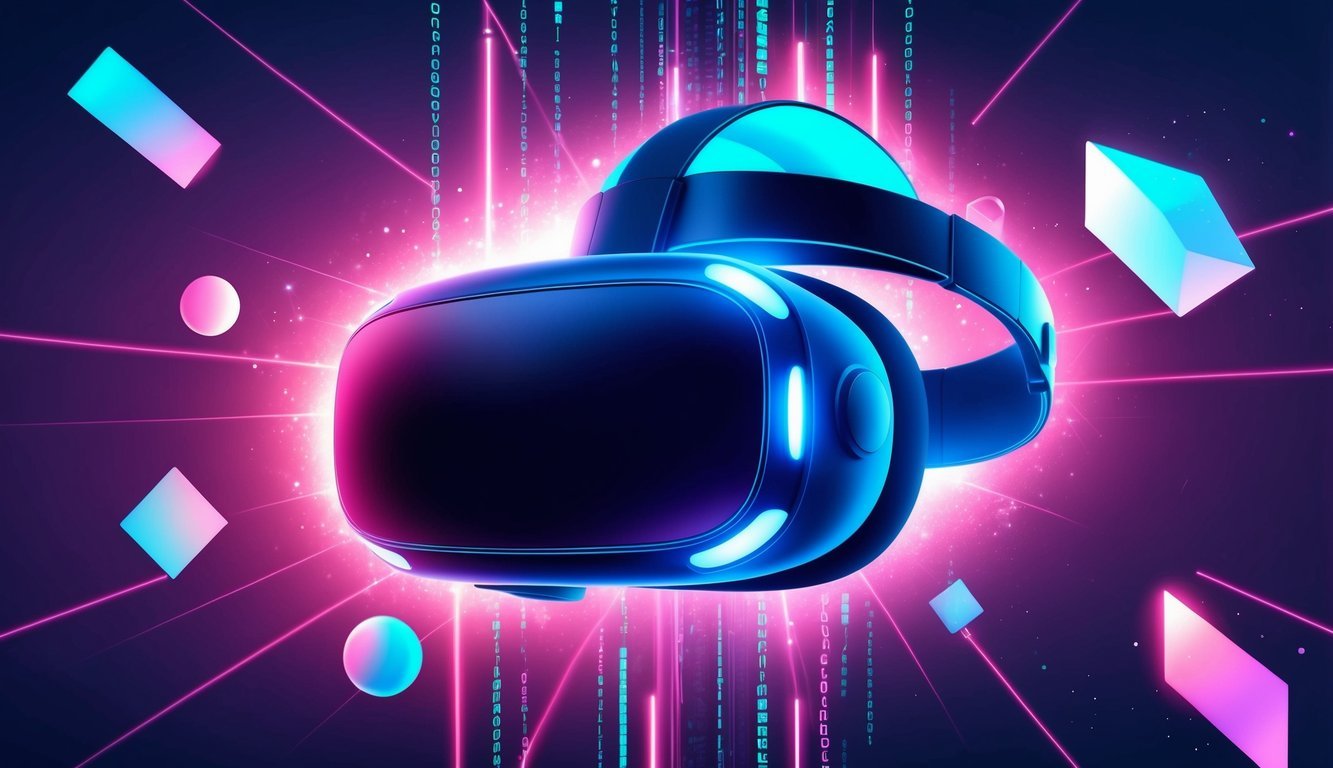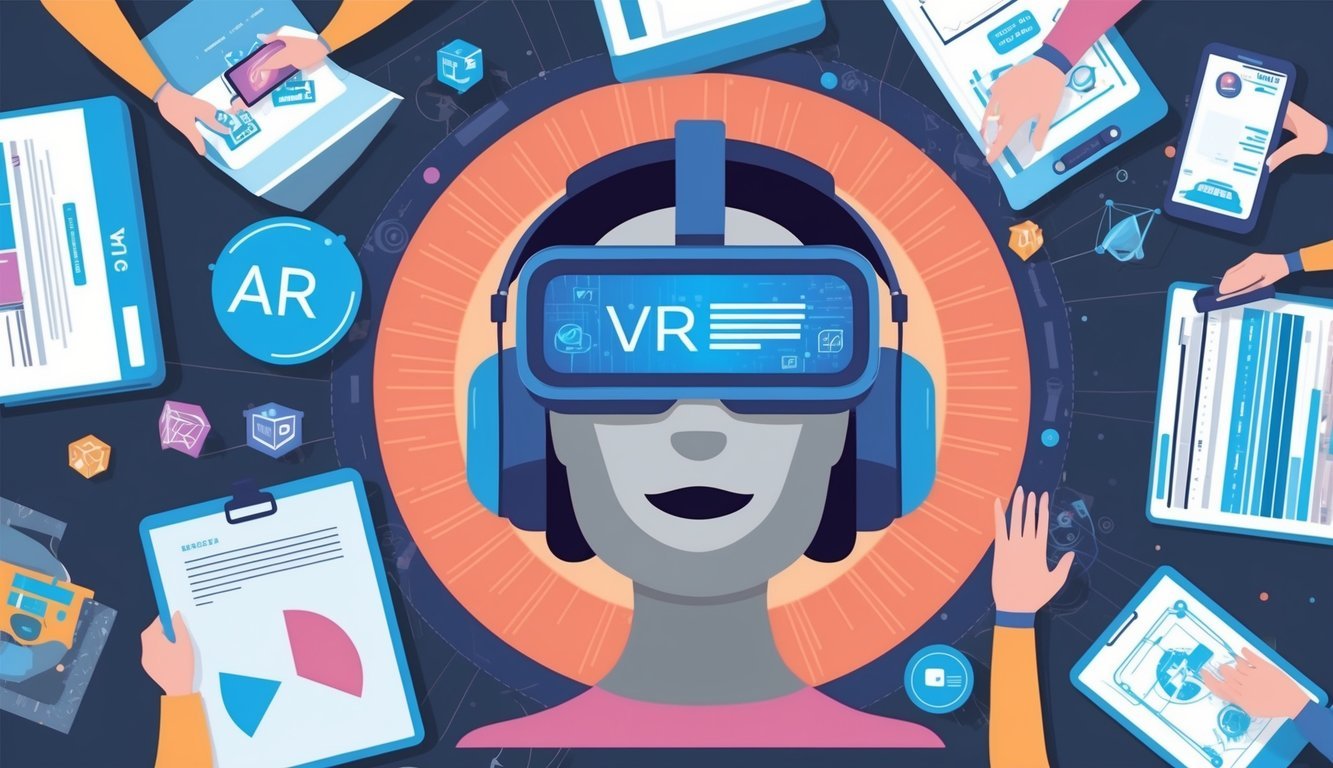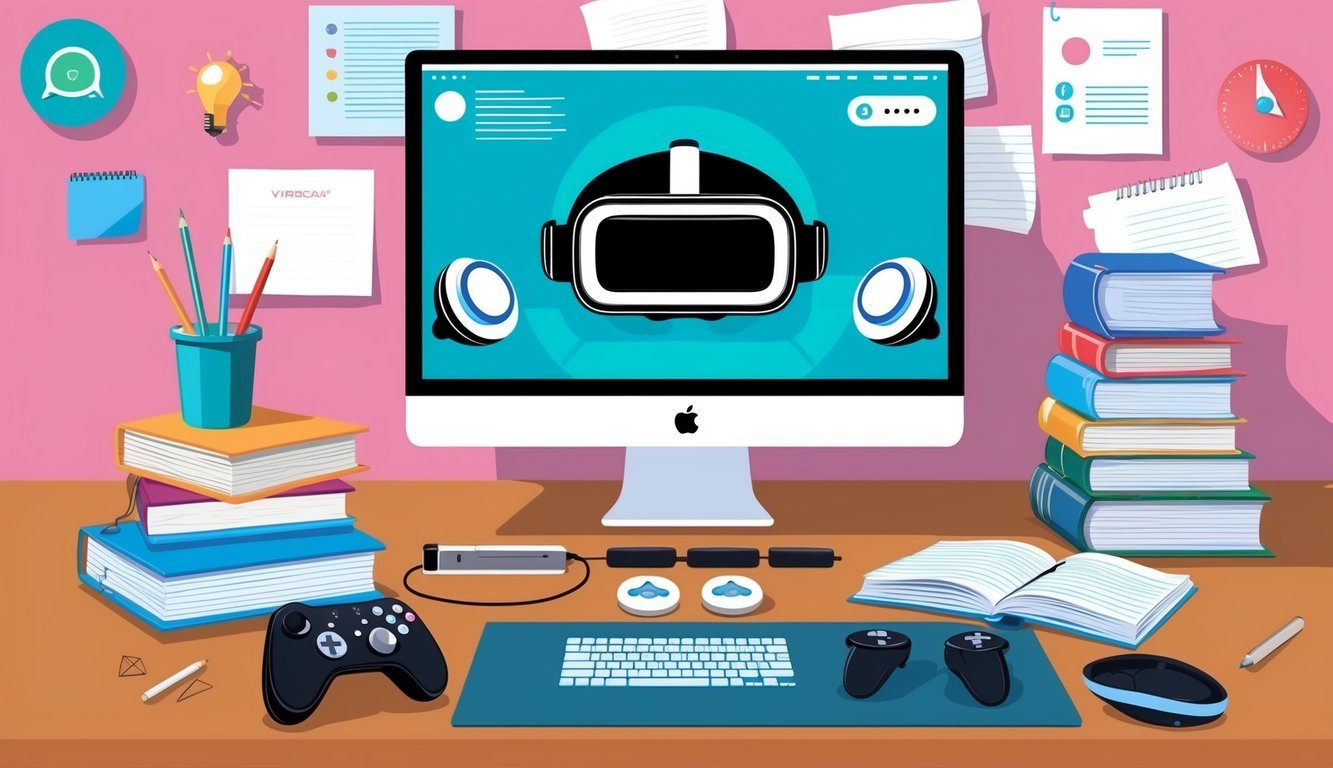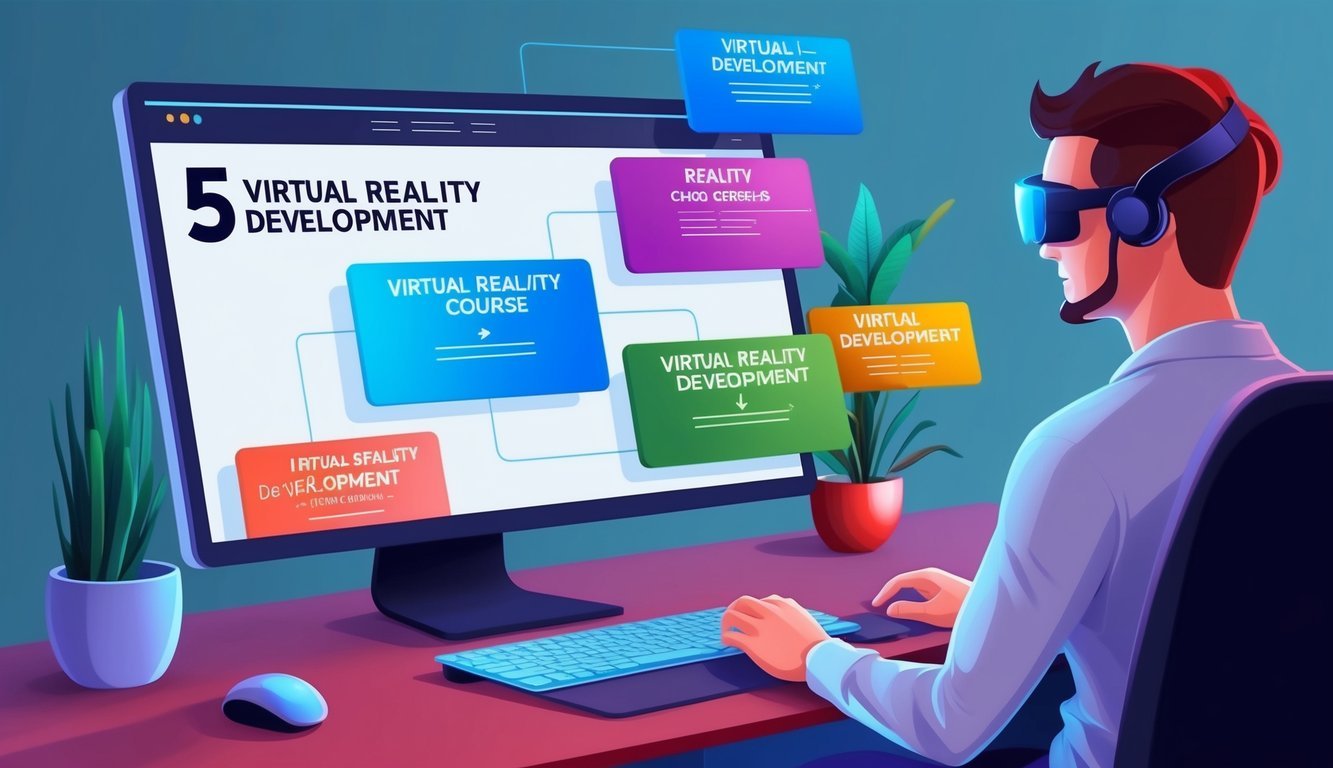Virtual reality isn’t just for gamers anymore—it’s changing how we learn and work! With VR technology, you can step into brand-new worlds and gain hands-on experience, no matter where you are.

Ever dreamed of creating your own VR apps and games? You’re in luck! Many online courses can help you learn the ropes of VR development. From basic 3D modeling to crafting full VR experiences, these classes let you learn at your own pace—and some even offer certificates upon completion.
Let’s dive into some fantastic options to kick off your VR journey!
1) Unity VR Development Course
Want to whip up some cool VR creations? Check out the Create with VR course from Unity.
It’s tailored for beginners who are eager to jump into VR development!
You’ll start from scratch and build your very own VR project.
This course takes you through the whole process—from designing and prototyping to completing your application.
You’ll tackle enjoyable challenges and quizzes to help you practice what you’ve learned along the way.
These little tests make sure you’re really getting the hang of things.
The icing on the cake? You’ll be using Unity, one of the hottest game engines out there.
It’s a choice of professionals, which means you’ll pick up some real-world skills.
By the end, you’ll know how to create immersive VR experiences.
Who knows? You might just be ready to launch your own VR games or apps!
This course is perfect for anyone excited about VR development.
Whether you’re keen on making games, training simulations, or unique VR experiences, this is a solid starting point.
2) Unreal Engine VR Creation
Are you ready to jump into VR development using Unreal Engine? You’ve got some awesome courses waiting for you!
A popular pick is the VR Development with Oculus and Unreal Engine.
It covers everything from content prep to actually submitting your game to the Oculus Store.
If you’re looking for something more advanced, check out the Advanced VR in Unreal Engine 5.
You’ll learn how to create high-quality, interactive visualizations for architectural designs.
Just starting out? Try the Unreal Engine VR Development Fundamentals course.
It helps you get up to speed with the basics of VR development in Unreal.
By the end of these courses, you’ll be well on your way to crafting immersive VR experiences!
3) XR Development with Vuforia
Ever wanted to create cool augmented reality apps? Vuforia is the tool for you! It’s super user-friendly and works seamlessly with Unity.
Check out some great online courses to learn how to use Vuforia and kick off your XR development journey.
You’ll discover how to create incredible AR experiences.
One impressive feature of Vuforia is its ability to let you create apps compatible with various devices.
No more worrying about making different versions for Android and iOS!
In these courses, you’ll learn to add virtual objects to the real world using your phone’s camera.
It’s like magic! Imagine making 3D models appear on flat surfaces or designing interactive games.
By the course’s end, you’ll be ready to create your own AR apps.
Who knows? You might just invent the next big AR game or a handy tool for businesses.
4) Introduction to Oculus Rift

Want to dive into VR development specifically for Oculus headsets? You’re in luck! There are some fantastic courses out there just waiting for you.
Unity and Oculus have teamed up to offer a free, comprehensive VR development course.
It’s perfect if you already have some familiarity with Unity and want to learn more VR-specific skills.
This course covers loads of exciting topics: from hand presence and VR audio to making users move comfortably.
It’s all taught by experts from Unity and Oculus.
If Unreal Engine is more your speed, don’t sweat it! There’s a great course tailored for you too.
It’ll guide you from concept to submitting your game to the Oculus Store.
Both of these courses teach best practices for VR development.
You’ll learn how to make your games look fantastic and run smoothly on Oculus headsets.
By the end, you’ll have the skills to design your own VR experiences.
Who knows? Your game could be the next big hit on the Oculus Store!
5) Google AR & VR Basics

Looking to learn about augmented and virtual reality from the pros? Google has some fantastic courses to get you started.
Check out the Introduction to Augmented Reality and ARCore course on Coursera.
It covers the basics of AR and how it differs from VR.
If you’re interested in VR content creation, there’s the VR and 360 Video Production course.
You’ll learn about camera selection, shooting techniques, and post-production.
These courses cater to beginners, so don’t worry if you’re new to the world of AR and VR.
You’ll get practical experience and learn from Google’s own experts.
The cool thing? You can tackle these courses online at your own pace—perfect for fitting into your busy schedule!
Overview of Virtual Reality Development

Virtual reality (VR) is an exciting field with endless possibilities.
It opens the door to creating immersive digital worlds and experiences.
VR development blends computer graphics, programming, and design skills all into one fun package!
Key Technologies in VR
VR headsets are the primary way people step into virtual worlds.
Popular choices include the Oculus Quest and HTC Vive.
These devices use special lenses and screens to deliver stunning 3D images.
Motion tracking is essential for a smooth VR experience.
It lets the system follow where you’re moving and looking.
Most headsets come equipped with built-in cameras and sensors for this purpose.
3D graphics engines, like Unity and Unreal Engine, power the visuals you see in VR.
They help create realistic environments and objects that feel believable.
Don’t forget audio! Spatial sound enhances the realism by changing based on your position in the virtual space.
It’s like music to your ears—literally!
Applications of VR Development
Gaming is a major area for VR, allowing you to create immersive worlds for players.
Genres like action, adventure, and puzzles shine in VR settings.
Education is another exciting use for VR.
It enables virtual classrooms or training simulations, providing hands-on experiences without real-world risks.
Healthcare also reaps the benefits of VR.
Doctors can practice surgeries, and therapists can help patients tackle phobias.
VR often gives patients a better understanding of their conditions.
Architectural design also benefits immensely.
You can walk through buildings before they’re constructed, helping catch design flaws early in the process.
And let’s not overlook virtual tourism.
People can “visit” far-off places from home, opening up new travel experiences for everyone.
Choosing the Right VR Course

Finding the right course in virtual reality can feel a bit overwhelming, but it doesn’t have to be! Here are some tips to help you decide and assess your skill level before you sign up.
Factors to Consider
When you’re choosing a VR course, think about the format. Online courses let you learn at your own speed, while in-person classes give you hands-on practice that can be super valuable.
Also, review the course content.
Does it cover the topics you’re interested in? Make sure it teaches tools like Unity or Unreal Engine since those are industry standards.
Don’t forget to consider the instructors! Look for courses taught by professionals with real VR experience.
And take a peek at reviews from past students; those can be quite telling about the quality of the course.
Cost is another factor.
Some courses are free, while others might put a dent in your wallet.
Just make sure you’re getting your money’s worth!
Skill Level Assessment
Before settling on a course, assess your VR knowledge.
Are you a total newbie or do you have some basics down?
If you’re starting fresh, give introductory courses like Udacity’s VR Intro a go.
They’ll walk you through VR basics and simple projects.
If you’ve got some coding experience, seek out intermediate courses covering more complex VR topics or specific tools.
For those of you already knee-deep in the industry, consider advanced courses focusing on cutting-edge VR tech.
Topics like AI in VR or advanced graphics can keep you ahead of the curve.
Plus, exploring automation technologies alongside VR can be an intriguing endeavor—check out the best RPA courses for 2025 for some insights.
Blending VR, AI, and automation can lead you to create even smarter virtual environments.
Try taking online quizzes or tackling sample VR projects to assess your skills.
This can guide you toward a course that’s just the right challenge for you.
Frequently Asked Questions

Curious about getting into virtual reality development? You’re not alone! Let’s answer some of the most common questions about jumping into this field.
Where can I pick up VR development skills online for free?
You can find free VR development courses on platforms like Coursera and Udacity. Coursera offers several free VR courses that you can audit.
Unity also provides free tutorials on their learning platform.
What are some beginner-friendly virtual reality development courses?
If you’re just starting out, I recommend the Introduction to Virtual Reality course on Coursera.
It covers all the fundamentals of VR.
The Unity VR Development course is another great starting point!
Can I learn virtual reality development through Coursera, and if so, which courses are the best?
You absolutely can! Coursera has a ton of VR development courses.
Check out the Virtual Reality Specialization—it’s highly rated and includes five courses that guide you through VR basics, 3D modeling, and beyond.
What kind of software do most VR game developers use?
Typically, VR game developers use Unity or Unreal Engine.
These robust game engines come with built-in VR support.
Unity is favored for mobile VR, while Unreal shines when high-end graphics are the goal.
Are there any VR development courses that specialize in healthcare, like nursing?
Some courses do cover VR in healthcare, though they’re a bit scarce.
Look for specialized webinars or workshops from healthcare tech companies.
Universities with VR labs often offer intriguing courses too.
What’s the educational path for becoming a professional in VR development?
Start with a degree in computer science or game development, then dive into VR-specific courses like Unreal Engine VR Creation.
Build up a portfolio of VR projects, and consider doing a VR bootcamp or internship to gain hands-on experience.

